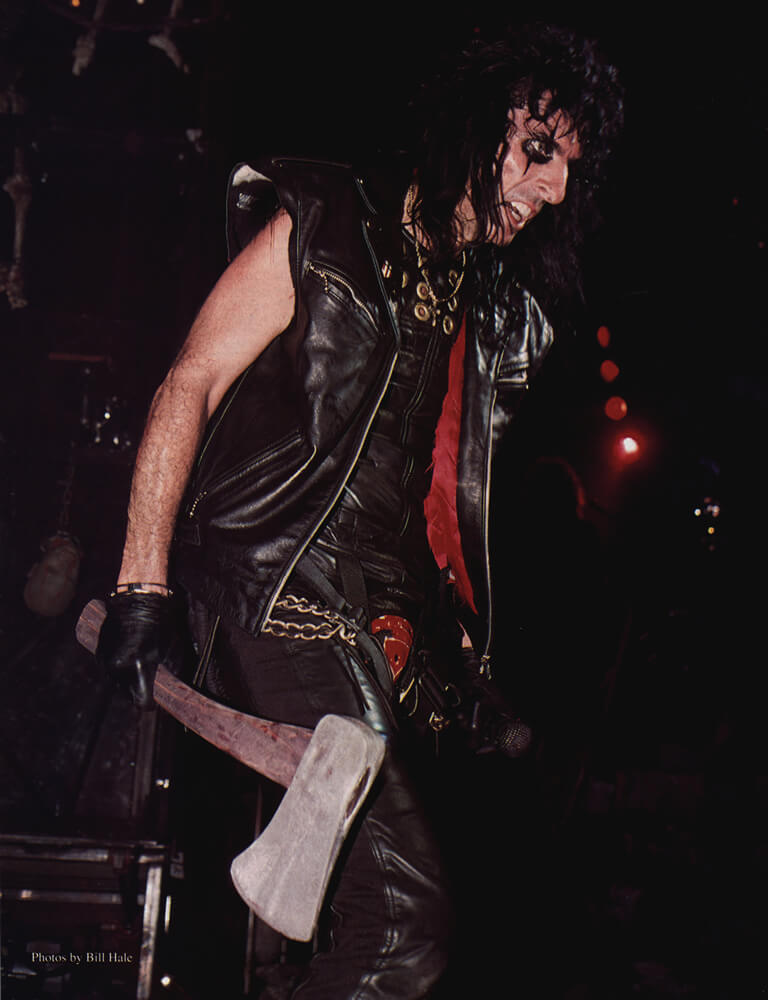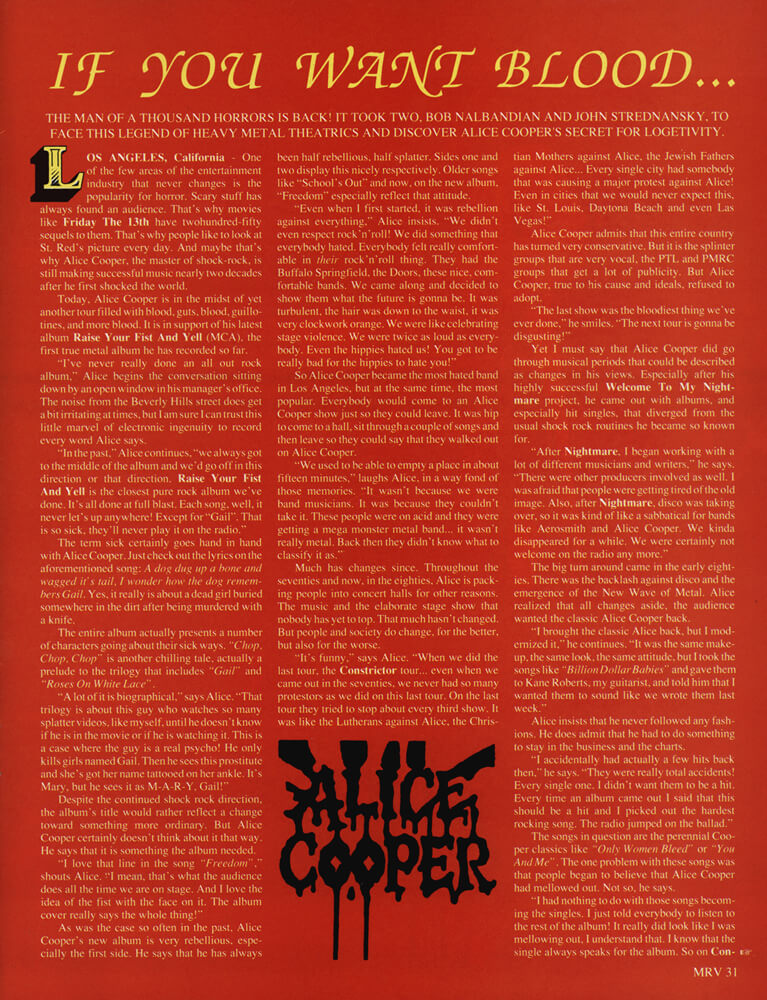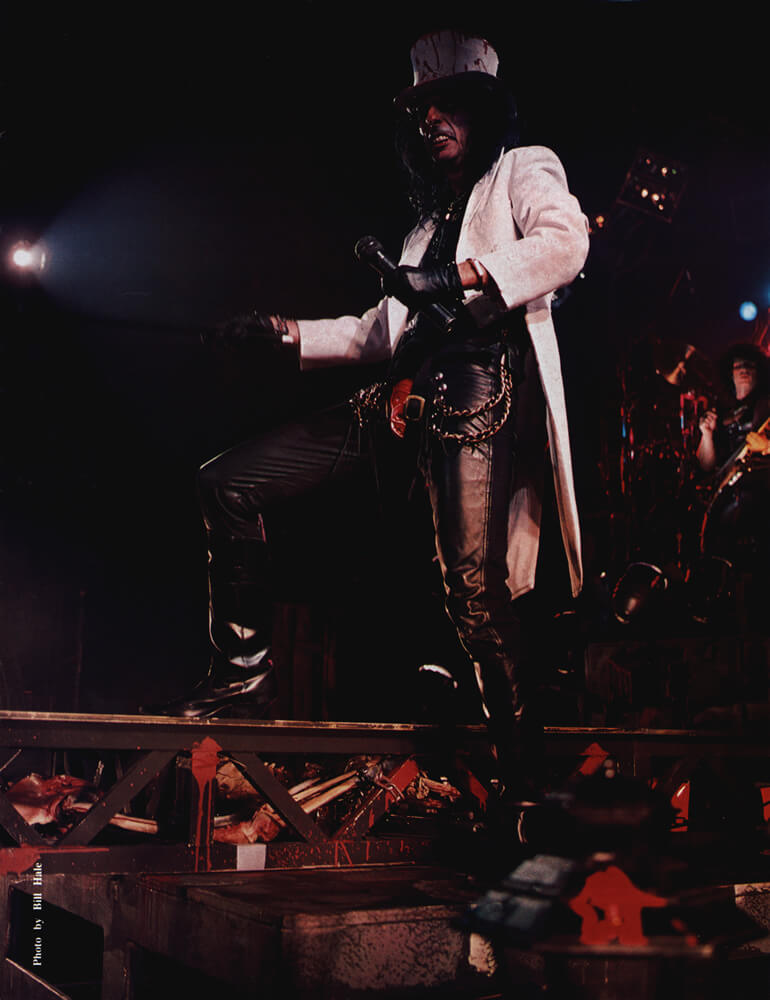Article Database

Metal Rendezvous
January 1988
If You Want Blood... You've Got It!
The man of a thousand horrors is back! It took two, Bob Nalbandian and John Strednansky, to face this legend of heavy metal threatrics and discover Alice Cooper's secret for longevity.
Author: Bob Nalbandian and John Strednansky
LOS ANGELES, California — One of the few areas of the entertainment industry that never changes is the popularity of horror. Scary stuff has always found an audience. That's why movies like Friday the 13th have two hundred-fifty sequels to them. That's why people like to look at St. Red's picture every day. And maybe that's why Alice Cooper, the master of shock-rock, is still making successful music nearly two decades after he first shocked the world.
Today, Alice Cooper is in the midst of yet another tour filled with blood, guts, blood, guillotines, and more blood. It is in support of his latest album Raise Your Fist And Yell (MCA), the first true metal album he has recorded so far.
"I've never really done an all out rock album," Alice begins the conversation sitting down by an open window in his manager's office. The noise from the Beverly Hills street does get a bit irritating at times, but I am sure I can trust this marvel of electronic ingenuity to record every word Alice says.
"In the past," Alice continues, "we always got to the middle of the album and we'd go off in this direction or that direction. Raise Your Fist And Yell is the closest pure rock album we've done. It's all done at full blast. Each song, well, it never lets up anywhere! Except for "Gail". That is so sick, they'll never play it on the radio.
The term sick certainly goes hand in hand with Alice Cooper. Just check out hte lyrics on the aforementioned song: A dog dug up a bone and wagged it's tail, I wonder how the dog remembers Gail. Yes, it really is aobut a dead girl buried somewhere in the dirt after being murdered with a knife.
The entire album actually presents a number of characters going about their sick ways. "Chop, Chop, Chop" is another chilling tale, actually a prelude to the trilogy that includes "Gail" and "Roses On White Lace".
"A lot of it is biographical," says Alice. "That trilogy is about this guy who watches so many splatter videos, like myself, until he doesn't know if he is in the movie or if he is watching it. This is a case where the guy is a real psycho! He only kills girls named Gail. Then he sees this prostitute and she's got her name tattooed on her angle. It's Mary, but he sees it as M-A-R-Y, Gail!"
Despite the continued shock rock direction, the album's title would rather reflect a change towards something more ordinary. But Alice Cooper certainly doesn't think about it that way. He says that it is something the album needed.
"I love that line in the song "Freedom"," shouts Alice. "I mean, that's where the audience does all the time we are on stage. And I love the idea of the first with the face on it. The album cover really says the whole thing!"
As was the case so often in the past, Alice Cooper's new album is very rebellious, especially the first side. He says that he has always been half rebellious, half splatter. Sides one and two display this nicely respectively. Older songs like "School's Out" and now, on the new album, "Freedom" especially reflect that attitude.
"Even when I first started, it was rebellion against everything," Alice insists. "We didn't even respect rock'n'roll! We did something that everybody hated. Everybody felt really comfortable in their rock'n'roll thing. They had the Buffalo Springfield, the Doors, these nice, comfortable bands. We came along and decided to show them what the future is gonna be. It was turbulent, the hair was down to the waist, it was very Clockwork Orange. We were like celebrating stage violence. We were twice as loud as everybody. Even the hippies hated us! You got to be really bad for the hippies to hate you!"
So Alice Cooper because the most hated band in Los Angeles, but at the same time, the most popular. Everybody would come to an Alice Cooper show just so they could leave. It was hip to come to a hall, sit through a couple songs and then leave so they could say that they walked out on Alice Cooper.
"We used to be able to empty a place in about fifteen minutes," laughs Alice, in a way fond of those memories. "It wasn't because we were bad musicians. It was because they couldn't take it. These people were on acid and they were getting a mega monster metal band... it wasn't really metal. Back then they didn't know what to classify as."
Much has changed since. Throughout the seventies and now, in the eighties, Alice is packing people into concert halls for other reasons. The music and the elaborate stage show that nobody has yet to top. That much hasn't changed. But people and society do change, for the better, but also for the worse.
"It's funny," say Alice. "When we did the last tour, the Constrictor tour... even when we came out in the seventies, we never had so many protesters as we did on this last tour. On the last tour they tried to stop about every third show. It was like the Lutherans against Alice, the Christian Mothers against Alice, the Jewish Fathers against Alice... Every single city had somebody that was causing a major protest against Alice! Even in cities that we would never expect this, like St. Louis, Daytona Beach and even Las Vegas!"
Alice Cooper admits that this entire country has turned very conservative. But it is the splinter groups that are very vocal, the PTL and PMRC groups that get a lot of publicity. But Alice Cooper, true to his cause and ideals, refused to adopt.
"The last show was the bloodiest thing we've ever done," he smiles. "The next tour is gonna be disgusting!"
Yet I must say that Alice Cooper did go through musical periods that could be described as changes in his views. Especially after his highly successful Welcome To My Nightmare project, he came out with albums, and especially hit singles, that diverged form the usual shock rock routines he became so known for.
"After Nightmare, I began working with a lot of different musicians and writers," he says. "There were other producers involved as well. I was afraid that people were getting tired of the old image. Also, after Nightmare, disco was taking over, so it was kind of like a sabbatical for bands like Aerosmith and Alice Cooper. We kinda disappeared for a while. We were certainly not welcome on the radio any more."
The big turn around came in the early eighties. There was the backlash against disco and the emergence of the New Wave of Metal. Alice realized that all changes aside, the audience wanted the classic Alice Cooper back.
"I brought the classic Alice back, but I modernized it," he continues. "It was the same make-up, the same look, the same attitude, but I took the songs like "Billion Dollar Babies" and gave them to Kane Roberts, my guitarist, and told him that I wanted them to sound like we wrote them last week."
Alice insists that he never followed any fashions. He does admit that he had to do something to stay in the business and the charts.
"I accidentally had actually a few hits back then," he says. "They were really total accidents! Every single one. I didn't want them to be a hit. Every time an album came out I said that this should be a hit and I picked out the hardest rocking song. The radio jumped on the ballad."
The songs in question are the perennial Cooper classics like "Only Women Bleed" or "You And Me". The one problem with these songs was that people began to believe tha Alice Cooper had mellowed out. Not so, he says.
"I had nothing to do with those songs becoming the singles. I just told everybody to listen to the rest of the album! It really did look like I was mellowing out. I understand that. I know that the single always speaks for the album. So on Constrictor and Raise Your Fist And Yell, you won't see any ballads at all."
So Alice went on and at the turn of the decade did an album called Flush The Fashion. That was certainly more than just an album title he quickly points out.
"That was like f**k off!" He laughs. "That was a very confused period. I took my make-up off and made myself look like a neo-mean kind of character. As far as the music, I was then working with Roy Thomas Baker... I went straight to the National Enquirer and every single song title on that album was from a headline."
During all that time, Alice Cooper was a highly visible performer in America. With his exposure in everything from rock to pop to family magazines and talk shows, he easily could have drifted into a political area with his music. But his downright hate for such subjects didn't let that happen.
"Politics and religion have nothing to do with rock'n'roll," he claims with strong conviction, "Rock'n'roll is basically sex, violence and music, that's the way we think. And sensationalism! I don't see anything sensational about religion or politics. Of course there is also horror. That's what we specialize in. Even "Freedom" on the new album is a satire, telling Tipper Gore that this isn't Russia! Kids aren't so stupid that they don't know what satire is!"
Alice Cooper is also insistent on pointing out once again that what he does is horror, plain and simple. There is nothing Satanic or even remotely about Satan in his lyrics or music as some people might be led to believe.
"I don't even know anybody who's into Satan," he says. "That's like asking me how many cannibals do I know. Most of these guys in rock bands are from normal American families. They're not living in the gutter somewhere or put cats in the freezer!" (I thought St. Red was! — Ed.)
So Alice Cooper rocks on with his horror filled shows because as with comedy, there will always be an audience for such entertainment. Alice has always been interested in it and he loves to see the reactions of a live audience, but he is careful that it doesn't come off as being corny. That is quite possible, he says.
"Most rock'n'roll shows you see take it only that far. They get their lights, they get their prop and do it. We take it all the way out to here. We are really show-offs! We wanna take it to the point where we over do it so they can't believe what they are seeing. So we hire illusionists, people who have worked on Aliens, and people who have done The Fly."
His main goal is to have people walk out of an Alice Cooper show exhausted, wondering how they're gonna talk about it the next day. If Alice Cooper is guilty of anything, then it's from over-doing the show. I see nothing wrong with that. THe new stage is so great that some people might be too wary to get close to it. Our photographer Bill Hale did, and his jacket and camera equipment have been permanently scarred by the experience. Cooper blood everywhere, he screamed throughout the office the next day....
As a matter of fact, it would bother Alice if some parents would come to see his shows, but he does admit that he prefers a much younger audience. The parents should stay wayi in the back, he says.
Alice Cooper was instrumental in bringing visual excitement and hard driving rock music together. He now feels that the two, show business and rock'n'roll belong together.
"Rock certainly could survive on its own, but it wouldn't be nearly as exciting," he claims. "It's getting to a point where an audience almost expects a show. What killed a lot of the seventies bands is that they didn't have any stage show. You can only see a band play that many drum solos so many times. The guys in my band now, they did one you're with me and the other night went to see Motley Crue and Whitesnake. After about four songs they were asking just when they were gonna do something! And I said they are not gonna do something! So everybody to them is now boring."
In spite of his dependence on his live performances, Alice does think highly of his musicians and the music he has performed over the years. He feels that his music would have survived just as well without the outrageousness that we now have gotten accustomed to with Cooper's image.
"In a way I think that the show might have hurt my musical career," he says. "People would say that it was a great show but they would forget to listen to the music! I will put this band against anybody. The guys play great, the songs are written well... Even without a show, I would take Raise Your Fist and put it up against any other record out."
On a musical term, Alice Cooper puts his music mostly against the music of his contemporaries. Aerosmith. That is the second time that the Boston rockers have been mentioned by Alice and it is kind of ironic that both acts are experiencing this type of renaissance right now.
"We were both very Yardbirds orientated," says Alice. "If there was a definitive seventies sound, then Aerosmith and us, we probably came very close. Now, with Aerosmith bouncing back, it's gonna be like Hearns and Leonard again. In the seventies, this was exactly it. Us and Aerosmith battling it out. I am really happy for Aerosmith, they are a good band. They've gone through an awful lot of s**t. It's gonna be a lot of fun competing with them again."
Alice Cooper believes that musically, bands were better in the seventies than they are today. While they didn't have as much energy, they seemed more versatile.
"I now have a band together," he says proudly, "that has captured the energy of an eighties metal band. I have then wrapped this kind of show around that and come up with something totally current. I also have music that's a bit more complicated than most of the metal stuff today. Most of the eighties bands are missing creativity. I mean, look at the ads in BAM magazine. All those bands, but the guys are all the same guy!"
Back in the seventies, Alice Cooper of course had put together the infamous Billion Dollar Babies line-up. That backup band actually released one album after breaking away form Alice on Polydor, but it didn't do all that well.
"What made that band so special," Alice remembers, "was producer Bob Ezrin. He was the kind of guy who was more important than the band itself. He made the sound on albums like Love It To Death and Killer. After that, we took it from there, but he really taught us a lot. He certainly made me a better songwriter."
Alice Cooper, his music and image exerted tremendous influence on many bands around today. Bands like Kiss, Lizzy Borden, Motley Crue wouldn't be what they are today if it weren't for the genius of Alice Cooper.
"Yeah, Kiss even admitted that if one Alice Cooper works, then four will as well," says ALice. "They've always given me credit for that. Motley has done the same thing. Bands that drive me crazy, like W.A.S.P., the guy goes through everything I've ever said in every magazine and quotes it again. I just read a thing in Circus recently that said 'The sicker they get, the sicker we get' THat was like my most famous line in the seventies! And this guy is trying to pretend he thought of that just now, and that's only about the fortieth thing I caught him doing that was an absolute steal. That starts to piss me off! Blackie Lawless doesn't have a creative bone in his body!"
With his new stage show and album, it is certain that there will be yet another generation of young kids who one day will form a band influenced by the great Alice. No matter whether these are seventies or the eighties, as long as Alice Cooper is still around, we can watch an original doing what he does best. Entertain the young and old with the uncanny ability, threatrics and talent only one man possesses. Watch out, because this is really the Revenge Of Alice, 1988 style!
By the way, Alice, I checked. I checked, it really is true that you can hear the whales if you stick your head under the water on Maui!
(Originally published in Metal Rendezvous International, January/February 1988; Vol. 4, Issue 1; MRV #21)






